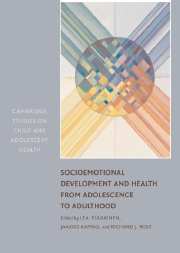Book contents
- Frontmatter
- Contents
- List of Contributors
- Preface
- Introduction
- PART I LONGITUDINAL AND BEHAVIORAL GENETIC APPROACHES
- 1 The Jyväskylä Longitudinal Study of Personality and Social Development (JYLS)
- 2 Genetic and Environmental Influences on Social Behavior and Health
- 3 Social Behaviors and Health in Twins: The FinnTwin Studies
- PART II ADOLESCENT HEALTH-RELATED BEHAVIOR AND ADULT HEALTH
- PART III SOCIOEMOTIONAL BEHAVIOR IN EARLY ADOLESCENCE
- PART IV LIFE COURSE AND HEALTH
- Summary and Future Directions
- References
- Author Index
- Subject Index
3 - Social Behaviors and Health in Twins: The FinnTwin Studies
Published online by Cambridge University Press: 07 December 2009
- Frontmatter
- Contents
- List of Contributors
- Preface
- Introduction
- PART I LONGITUDINAL AND BEHAVIORAL GENETIC APPROACHES
- 1 The Jyväskylä Longitudinal Study of Personality and Social Development (JYLS)
- 2 Genetic and Environmental Influences on Social Behavior and Health
- 3 Social Behaviors and Health in Twins: The FinnTwin Studies
- PART II ADOLESCENT HEALTH-RELATED BEHAVIOR AND ADULT HEALTH
- PART III SOCIOEMOTIONAL BEHAVIOR IN EARLY ADOLESCENCE
- PART IV LIFE COURSE AND HEALTH
- Summary and Future Directions
- References
- Author Index
- Subject Index
Summary
INTRODUCTION
Family twin, and adoption studies have provided evidence for cultural and biological inheritance in human behavior and health (Boomsma, Busjahn, & Peltonen, 2002). Because currently known genes account for only a fraction of the estimated genetic variance of most traits, more knowledge of the dynamics of gene action and of specific environmental conditions is needed. Twin and twin-family studies with multiple measurements over time can permit a more detailed assessment of the development aspects of behavior, growth, and health, and how the relative roles of genes and environment unfold over time.
After more than a decade of research with the older Finnish twin cohort, which consists of twins born before 1958 (Kaprio & Koskenvuo, 2002), our research group realized in the mid-1980s that development of younger twin cohorts for prospective studies would be of great utility. Studies of children, adolescents, and young adults are needed for such studies of the development of behaviors that are relevant for maintaining health.
In Finland, two longitudinal studies of adolescent twins and their families, each with about 2,700 participating families, form a complementary, ongoing study base: FinnTwin16, initiated in 1991 (twins born 1974–1979) and FinnTwin12, initiated in 1994 (twins born 1983–1987). The fourth wave of data collection in FinnTwin16 was completed in 2003, and the third wave in FinnTwin12 was completed in 2005. The primary focus in these studies at present is on behavioral traits and growth, and their change over time.
- Type
- Chapter
- Information
- Publisher: Cambridge University PressPrint publication year: 2006
- 2
- Cited by



